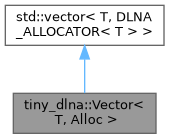Lightweight wrapper around std::vector with Arduino-friendly helpers and a pluggable allocator. More...
#include <Vector.h>

Public Types | |
| using | Base = std::vector< T, Alloc > |
| using | value_type = T |
| using | iterator = typename Base::iterator |
| using | const_iterator = typename Base::const_iterator |
Public Member Functions | |
| Vector ()=default | |
| Vector (size_t count) | |
| Vector (size_t count, const T &value) | |
| template<class It > | |
| Vector (It first, It last) | |
| Vector (std::initializer_list< T > il) | |
| Vector (const Alloc &alloc) | |
| void | eraseIndex (int index) |
| Erase element by index (no-op on out-of-range). | |
| iterator | erase (size_t index) |
| Convenience overload to erase by index. | |
| void | reset () |
| Reset the container by clearing and shrinking capacity to fit. | |
Detailed Description
class tiny_dlna::Vector< T, Alloc >
Lightweight wrapper around std::vector with Arduino-friendly helpers and a pluggable allocator.
This container inherits from std::vector to preserve its API and complexity guarantees while adding a few conveniences tailored for embedded/Arduino targets:
- Uses a configurable allocator (default: DLNA_ALLOCATOR<T>) defined by the library to enable custom allocation strategies or tracking.
- Keeps all standard std::vector constructors, types, and methods available.
- Exposes std::vector erase overloads and provides index-based helpers.
- Adds reset() which performs clear() followed by shrink_to_fit() to aggressively release memory.
Template parameters:
- Template Parameters
-
T Element/value type stored in the vector.
- Template Parameters
-
Alloc Allocator type (defaults to DLNA_ALLOCATOR<T> as configured in dlna_config.h).
- erase(size_t index): convenience overload that erases an element by index and returns the iterator following the erased element (or end() if the last element was erased). If the index is out of range, end() is returned and no action is taken.
- eraseIndex(int index): bounds-checked helper; does nothing on out-of-range indices.
Complexity: Matches std::vector for the corresponding operations (e.g. erase is linear in the number of moved elements). Reserve/capacity/iterator invalidation rules are also identical to std::vector.
Member Typedef Documentation
◆ Base
| using tiny_dlna::Vector< T, Alloc >::Base = std::vector<T, Alloc> |
◆ const_iterator
| using tiny_dlna::Vector< T, Alloc >::const_iterator = typename Base::const_iterator |
◆ iterator
| using tiny_dlna::Vector< T, Alloc >::iterator = typename Base::iterator |
◆ value_type
| using tiny_dlna::Vector< T, Alloc >::value_type = T |
Constructor & Destructor Documentation
◆ Vector() [1/6]
|
default |
◆ Vector() [2/6]
|
inlineexplicit |
◆ Vector() [3/6]
|
inline |
◆ Vector() [4/6]
|
inline |
◆ Vector() [5/6]
|
inline |
◆ Vector() [6/6]
|
inlineexplicit |
Member Function Documentation
◆ erase()
|
inline |
Convenience overload to erase by index.
- Parameters
-
index Zero-based index to erase.
- Returns
- iterator Iterator to the element following the erased one, or end() if none.
- Note
- Returns end() and performs no action if the index is out of range.
◆ eraseIndex()
|
inline |
Erase element by index (no-op on out-of-range).
- Parameters
-
index Zero-based index of the element to erase.
- Note
- Equivalent to erase(begin() + index) when in range; does nothing otherwise.
◆ reset()
|
inline |
Reset the container by clearing and shrinking capacity to fit.
Calls clear() followed by shrink_to_fit() to return memory to the system where supported. Useful on memory-constrained targets after large, temporary usage.
The documentation for this class was generated from the following file:
- src/basic/Vector.h